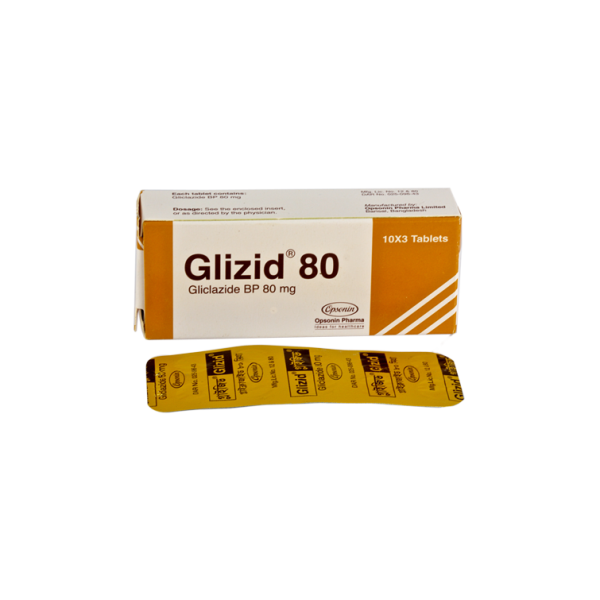
Glizid 80 mg Tablet
Tk7
- Stock: In Stock
- Brand: Opsonin Pharma Limited
- Product ID: Gliclazide
0 Pcs sold
1310 Interested
100% Secure Payment

Indications
Gliclazide is indicated for control of blood glucose in patients with non-insulin dependent diabetes mellitus (Type-II, maturity onset diabetes mellitus) whose hyperglycemia cannot be controlled by diet alone.
Therapeutic Class
Sulfonylureas
Pharmacology
Gliclazide stimulates the release of insulin from pancreatic beta-cells by facilitating Ca++ transport across the beta-cell membranes. It lowers blood glucose by stimulating the release of insulin from the pancreas, an effect dependent upon functioning beta cells in the pancreatic islets. Extrapancreatic effects also may play a part in the mechanism of action of oral sulfonylurea hypoglycemic drugs. Two extrapancreatic effects shown to be important in the action of Gliclazide are an increase in insulin sensitivity and a decrease in hepatic glucose production. The anti-oxidant, platelet inhibiting and fibrinolytic actions of Gliclazide involve processes which have been implicated in the pathogenesis of vascular complications of type 2 diabetes.
Dosage & Administration
Adult: The usual initial dose of Gliclazide is 40 to 80 mg daily, gradually increased, if necessary up to 320 mg daily until adequate control is achieved. A single dose should not exceed 160 mg. When higher doses are required it should be taken twice daily, according to the main meals of the day. For extended release tablet the initial recommended dose is 30 mg daily, even in elderly patients (>65 years); the daily dose may vary from 30 to 120 mg taken orally, once daily.
Gliclazide extend release tablet should be taken with food because there is increased risk of hypoglycemia if a meal is taken late. It is recommended that the medication be taken at breakfast time. If a dose is forgotten, the dose taken on the next day should not be increased. Dose titration should be carried out in steps of 30 mg, according to the fasting blood glucose response. Each step should last for at least two weeks. Gliclazide extend release tablet should be neither broken nor chewed. Gliclazide extend release tablet 30 mg, can replace Gliclazide 80 mg tablets for doses of 1 to 4 tablets per day.
Elderly: Plasma clearance of Gliclazide is not altered in the elderly and steady state plasma levels are similar to those in adults under 65 years. Clinical experience in the elderly shows that it is effective and well tolerated.
Children: Gliclazide as with other sulfonylureas is not indicated for the treatment of juvenile onset diabetes mellitus.
Gliclazide extend release tablet should be taken with food because there is increased risk of hypoglycemia if a meal is taken late. It is recommended that the medication be taken at breakfast time. If a dose is forgotten, the dose taken on the next day should not be increased. Dose titration should be carried out in steps of 30 mg, according to the fasting blood glucose response. Each step should last for at least two weeks. Gliclazide extend release tablet should be neither broken nor chewed. Gliclazide extend release tablet 30 mg, can replace Gliclazide 80 mg tablets for doses of 1 to 4 tablets per day.
Elderly: Plasma clearance of Gliclazide is not altered in the elderly and steady state plasma levels are similar to those in adults under 65 years. Clinical experience in the elderly shows that it is effective and well tolerated.
Children: Gliclazide as with other sulfonylureas is not indicated for the treatment of juvenile onset diabetes mellitus.
Interaction
The hypoglycemic effect of Gliclazide may be potentiated by NSAID (in particular aspirin), phenylbutazone, sulfonamides, coumarin derivatives, MAOIs, beta-adrenergic blockers, tetracyclines, chloramphenicol, clofibrate, cimetidine and miconazole tablets. Ingestion of alcohol may also increase the hypoglycemic effect of Gliclazide. Some drugs may on the contrary, reduce its activity e.g. barbiturates, corticosteroides, thiazide diuretics, thyroid hormones, laxatives and oral contraceptives.
Contraindications
Hypersensitivity to sulfonylurea, diabetes complicated by ketoacidosis with coma, as a sole therapy of insulin-dependent (Type-1) diabetes mellitus, diabetes when complicated by pregnancy & breast-feeding.
Side Effects
Hypoglycemia may occur in concurrent conditions such as hepatic & renal diseases, alcohol intoxication and adrenal and pituitary insufficiency. Mild gastro-intestinal disturbances including nausea, dyspepsia, diarrhea, and constipation have been reported but these types of adverse reactions can be avoided if Gliclazide is taken during a meal. Allergic dermatological reactions including rash, prurits, erythema, bullous eruption have been reported during treatment with the drug but are not known to be directly attributable to it. More serious reactions like leucopenia, thrombocytopenia, agranulocytosis, pancytopenia, hemolytic anemia, cholestatic jaundice, GI hemorrhage have not been reported with Gliclazide.
Pregnancy & Lactation
Pregnant Women: Gliclazide should not be used in pregnant women although animal studies of Gliclazide have not shown any teratogenic effect.
Nursing Mothers: This drug is contraindicated when breast feeding.
Nursing Mothers: This drug is contraindicated when breast feeding.
Precautions
Gliclazide should be used carefully in patients with hepatic impairment. If there is definite hepatic disease then gliclazide should not be used. Consucon (Gliclazide) can be used safely in patients with renal insufficiency as it is extensively metabolized. Consucon has less sudden hypoglycaemic episode than other sulfonylurea group of drugs.
Overdose Effects
Symptoms: Hypoglycaemia with or without coma, convulsions or other neurological disorders.
Management: Carbohydrate intake, dosage adjustment and/or change of diet may be helpful. Admin rapid IV inj of concentrated glucose soln for hypoglycaemic coma.
Management: Carbohydrate intake, dosage adjustment and/or change of diet may be helpful. Admin rapid IV inj of concentrated glucose soln for hypoglycaemic coma.
Use in Special Population
Elderly: Plasma clearance of Gliclazide is not altered in the elderly and steady state plasma levels are similar to those in adults under 65 years. Clinical experience in the elderly shows that it is effective and well tolerated.
Children: Gliclazide as with other sulfonylureas is not indicated for the treatment of juvenile onset diabetes mellitus.
Children: Gliclazide as with other sulfonylureas is not indicated for the treatment of juvenile onset diabetes mellitus.
Storage Conditions
Store in a cool and dry place, below 30° C and away from light.















